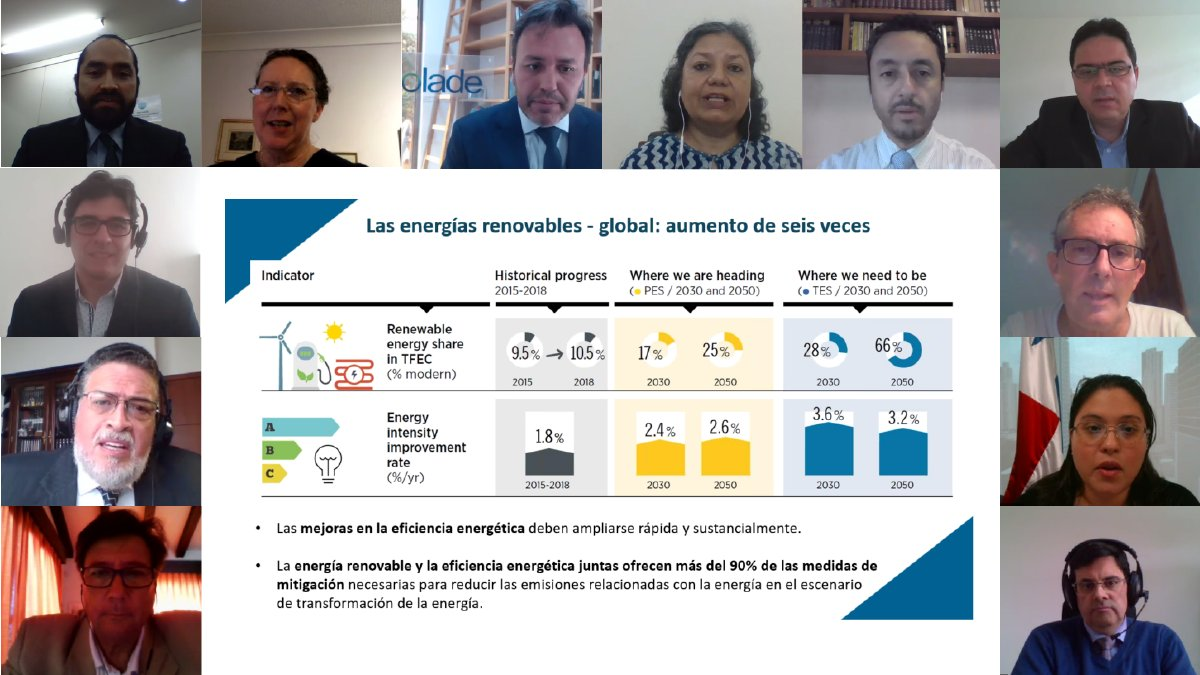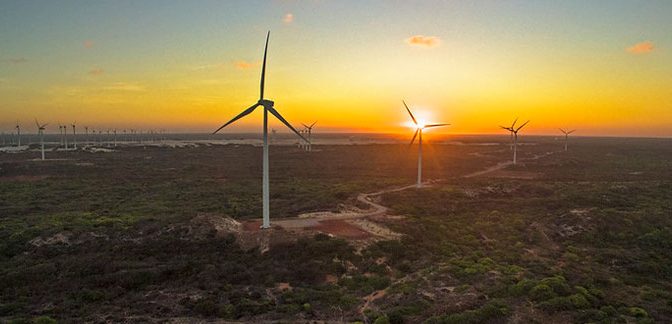High-level energy and climate decision makers from Latin America and the Caribbean underlined the importance of low-carbon energy policy to securing stable, long-term prosperity across regional economies, during a webinar co-hosted by the International Renewable Energy Agency (IRENA) and the Latin American Energy Organization (OLADE).
The virtual meeting entitled Accelerating Latin America’s Energy Transformation: RE and Economic Recovery was built around the recent analytical work featured in the Agency’s Global Renewables Outlook report, Power Generation Cost 2019 and the Post-Covid Recovery report – all of which reinforce the centrality of energy transformation to positive long-term economic outcomes in Latin America and around the world.
The discussion sought to deepen regional decision makers’ understanding of the strengthening economic case for more purposeful energy transformation action, highlighting the socio-economic benefits of a renewables-based energy system. The virtual meeting also served as an important platform for an exchange of knowledge and experience between regional governments and development partners. Representatives from Panama, Uruguay and the Global Wind Energy Council participated alongside IRENA and OLADE and the UK’s Regional COP 26 Ambassador for Latin America and the Caribbean.

Latin America has been severely affected by the Covid-19 pandemic, with persistent oil market volatility further compounding regional economic challenges. As region decision makers look to identify a pathway to recovery, Fiona Clouder, UK COP26 Regional Ambassador for Latin America and the Caribbean said the region’s recovery had to be green and sustainable, noting that it must be underpinned by renewable energy.
“In our changing world, building a green recovery and a sustainable future is even more important,” she said in opening remarks. “With vision, ambition and natural resources, countries in Latin America are well placed to transition to low carbon economies, using renewable energy as part of that transformation. COP26 gives us an opportunity to work together to share ideas and best practice to address the challenges of climate change and build a better future.”
In his opening remarks, Mr. Alfonso Blanco, Executive Secretary of OLADE stressed the importance of cooperation and highlighted the role of international and multilateral organisations to support the development of strategies for the economic recovery of the region, with the energy sector as the main driver during this process.
“We need to increase [renewable energy] investments throughout our region to reactivate the economy,” he said. “Between OLADE and IRENA, we have to start working on the necessary strategies to reactivate the regional economies and put the energy sector as the main driver of that recovery. In our region, there is a great potential in terms of energy resources, and therefore, the post-pandemic regional economies have the potential to be reactivated through the energy sector.”
Latin America is among the most dynamic renewable energy marketplaces in the world. Close to USD 120 billion of renewable investments were made between 2010 and 2015, placing several countries in Latin America among the top 10 largest renewable energy markets globally. Today, the region boasts around 200 gigawatts (GW) of installed renewable capacity, accounting for more than half of power capacity and a quarter of total primary energy.
Yet the region’s full potential remains unexplored. IRENA estimates that over 90 per cent of the region’s potential remains untapped and investment needs in the region are estimated at USD45 billion per year between now and mid-century – an increase of more than 10 per cent over current plans and policies. A regional initiative coordinated by OLADE sets a regional goal of reaching at least 70 per cent of renewable energy in electricity in by 2030.
Gauri Singh, Deputy Director-General of IRENA, said attracting the increased investment would offer the region strong returns, both in the short and long-term. “Latin America is tackling the economic toll of the pandemic and the World Economic Forum suggests the region’s economy is poised to contract in 2020,” she said, “meaning forward thinking energy and economic policy making is critical.”
“Accelerating the renewable energy transformation in Latin America and the Caribbean would create more than 3m jobs across the region by 2050,” she continued. “IRENA’s Transforming Energy Scenario offers the region the scope to develop economic returns of between 3 and 8 dollars on every dollar invested in the transformation.”
Many countries in the region have already taken positive steps towards economic recovery built around an accelerated energy transformation and the prioritization of low-carbon technologies. Serving as a platform to build regional understanding of the measures and policies being implemented, the discussion heard representatives from Panama and Uruguay share their plans and experiences.
Ms Guadalupe González, Director of Electricity, Secretary of Energy, Panama reinforced her country’s recognition of the socio-economic benefits. She noted that Panama has developed the Energy Transition Agenda 2030, built around five important pillars for renewable energy deployment that not only discuss the implementation of low-carbon technologies but also social aspects to improve energy access, job creation, role of women in the energy sector, building capacities on renewables, and the empowerment of the energy consumers.
Mr Fitzgerald Cantero, National Energy Director, Uruguay highlighted his country is following a pathway towards the decarbonisation of the economy starting with the power sector, which reached 98 per cent of renewable energy generation in 2019.He noted that Uruguay’s variable generation, particularly from wind energy, has left the country with a power surplus that can be used to support cross-border trade of power, promote the use of e-mobility and the potential production of green hydrogen for transport, industry and international trade.
Regional energy policy measures designed to aid the economic recovery following the COVID-19 pandemic were summarized as the development of more flexible power grids, energy efficiency solutions, electric vehicle charging for electric vehicle deployment, energy storage, interconnected hydropower, green hydrogen, and other technology investments consistent with long-term energy and climate sustainability.


